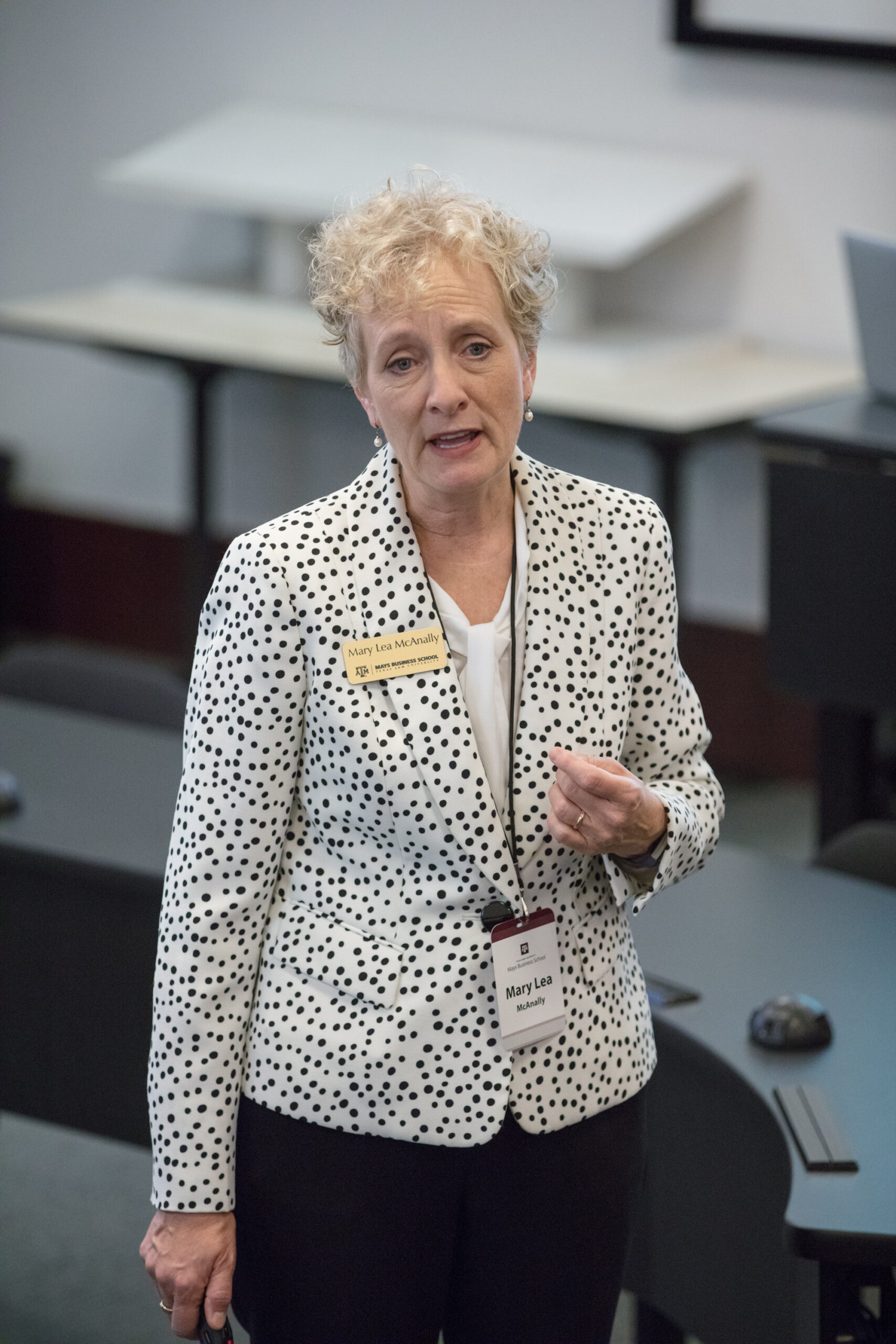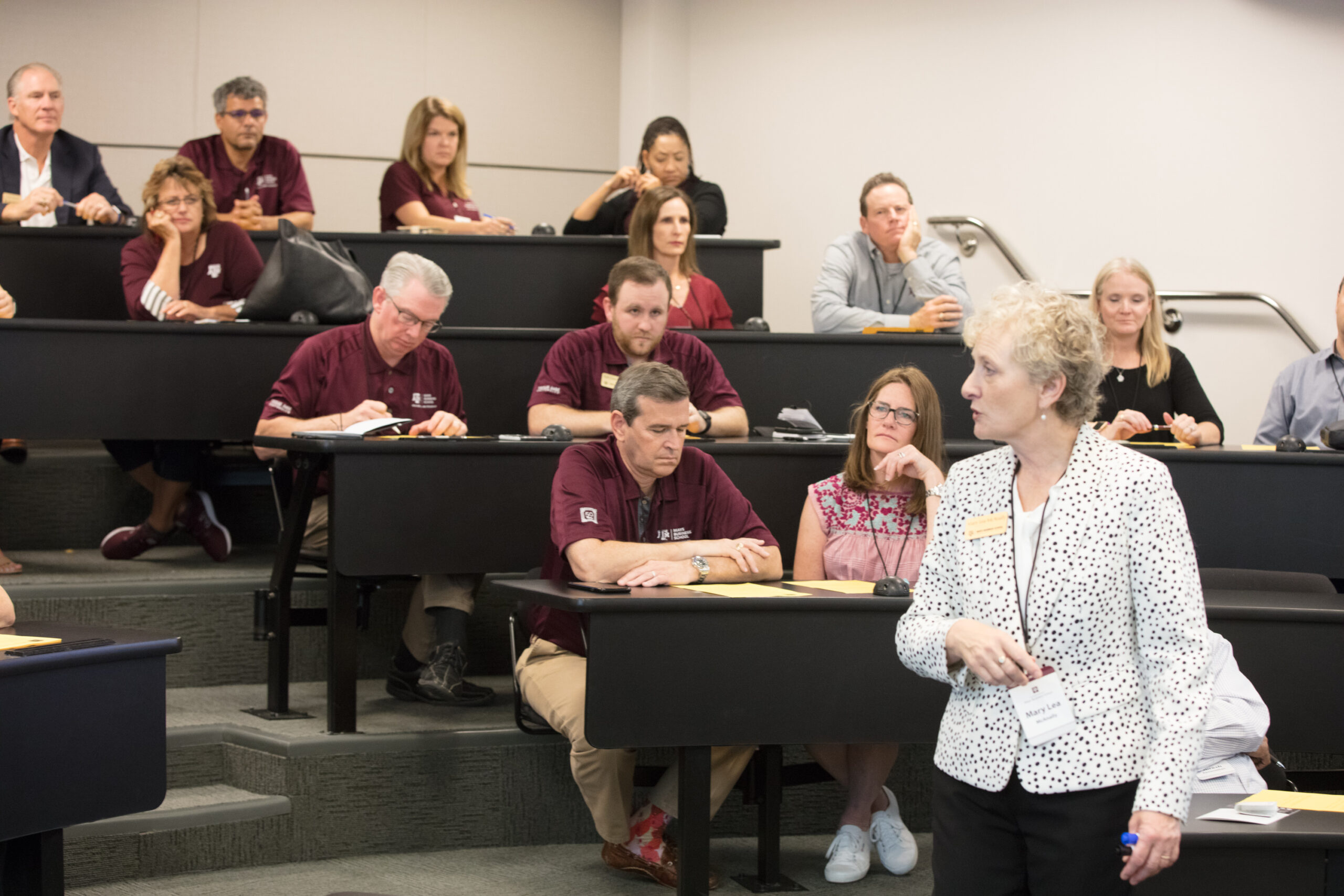Mary Lea McAnally on Mays transformational leaders
September 20, 2018
|
Andrew Barker

For 50 years Mays Business School has developed leaders who provide business solutions to solve the world’s problems in business, education, research, law, military, not for profit, government, and more. Mary Lea McAnally, former Director of Innovation and Strategic Planning and current PwC Professor in Accounting, was integral in developing the Mays Strategic Plan, vision, and mission that has allowed Mays to continue to innovate and respond to a changing world.
During Mays’ 50th Anniversary Celebration Sept. 7-8, McAnally articulated why a refined vision of leadership is needed, what the Mays Transformational Leaders initiative is all about, and how Mays is bringing this idea to students to develop them as MTL.
Why is a refined vision of leadership needed?
There are four forces of change that are distinct to our time: technology, a global economy, digitization/big data, and climate change.
McAnally explained that these forces of change created a new landscape of business known as VUCA:
- Volatile: subject to frequent rapid, significant change. The volatility of today is a brutal increase in the type, speed, volume, and scale of change.
- Uncertain: unpredictable. The past can longer predict the future.
- Complex: multiplicity of issues and factors. The world is much more complicated due to increased globalization and digitization.
- Ambiguous: lacks clarity. A global community signifies there may be multiple meanings and blurry understanding of situations.
“Mays Business School has to prepare leaders to lead in a VUCA world,” said McAnally. “What’s got us here is not going to get us there. Our traditional business and leadership models need to be revamped.”

What is the Mays Transformational Leaders initiative all about?
“We need leaders who are agile, flexible, adaptable, and creative,” said McAnally. “We need leaders who think before they do. We need leaders who have high emotional and social intelligence. And above all, we need leaders who welcome change, embrace change, and make change a part of their leadership practice.”
Mays Transformational Leaders inspire and influence others toward a common vision. They courageously challenge the status quo to create sustainable value and positive social impact. They also foster the development of self and others through reflective learning. In short, McAnally explained, Mays Transformational leaders transform organizations, others, and themselves.
How is Mays bringing this idea to students to develop them as MTL?
In order for Mays graduates to be transformational leaders in a VUCA world, Mays has developed a Strategic Learning Framework that includes
- Business acumen: the business knowledge that students gain. This includes a holistic view of enterprise, functional area expertise, and technical skills.
- Core competencies: practical skills needed for business and life. This includes communication, collaboration, leadership, critically thinking, acting ethically, managing people and projects, and creating opportunities.
- Mindsets: the way you think, and the questions you habitually ask. This includes mindsets that are ethical, entrepreneurial, analytical, global, systems thinking, inclusive, and focused on social impact.
Mays has excelled in teaching business acumen and developing core competencies over the last 50 years, McAnally said. “It’s the mindsets that are really requiring us to be innovative and creative in our classrooms,” said McAnally. “Mindsets can’t be taught. They can be developed, but, most importantly, they are cultivated.”
Faculty members introduce these mindsets at the outset of the students’ freshmen year and continue to repeat them throughout a student’s time at Mays. These mindsets must be cultivated through experience, so experiential learning is key. McAnally provided some examples that Mays faculty members employ:
- Class discussions
- Case studies
- Role playing
- Simulations and video gaming
- Consulting projects
- Integrated business experience (IBE)
To wrap up her presentation, McAnally led the room in a reflective learning exercise that surfaced the participants’ own leadership strengths, behaviors, and skills, which McAnally then aligned with Mays Strategic Learning Framework. Noting the increase in the decibel level in the room during the activity, McAnally mentioned that students are just as engaged and voluble when they participate in experiential learning.
“It takes a village to raise a child,” said McAnally. “It takes an entire business school to develop a leader. Fortunately, the students who are walking through our doors are ready for it. They are going to release a fury of transformation on the world.”


